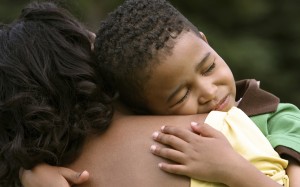The title of the song by Huey Lewis and the News makes me think about children with a history of attachment trauma. And the answer is frequently no. They do not believe in love. Parents can tell them they love them and they don’t believe it, because they don’t know what it means. Anyone who is wired for survival stays in hypervigilant mode most of the time, which precludes feelings of connections, closeness, and security. Our children have to really experience love at a deep, somatic level to believe in its existence – and to believe they are truly loved and treasured. But how do we give them that kind of experience when we are also in survival mode, trying to manage their behaviors day after day? I think providing the experience of love has to planned, and for some families, the experience has to take place with the help of a therapist, because otherwise it is just too difficult! The most ideal situation is regular, daily time to let go of all the conflicts and frustrations and snuggle, talk, and be close. Bedtime is a wonderful time for planned nurturing, but first thing in the morning closeness can help to start the day off right with a traumatized child!
Category Archives: Uncategorized
A common parent statement: “I can’t nurture her until she starts treating me right.”
 It makes sense that parents feel this way when they have experienced intense hurt related to repeated rejection and disrespect from their traumatized adopted and foster children. However, there exists a real Catch-22: When traumatized or hurt children do not trust adults as sources of comfort and security, they are unable to trust their authority. They do not believe that adults have their best interest at heart—they believe adults are out to defeat them, criticize them, or harm them. None of us respects the authority of someone who we believe is an enemy.
It makes sense that parents feel this way when they have experienced intense hurt related to repeated rejection and disrespect from their traumatized adopted and foster children. However, there exists a real Catch-22: When traumatized or hurt children do not trust adults as sources of comfort and security, they are unable to trust their authority. They do not believe that adults have their best interest at heart—they believe adults are out to defeat them, criticize them, or harm them. None of us respects the authority of someone who we believe is an enemy.
We also have to remember that children put up walls and close themselves off to expectations of love when they are only infants. When hope of being loved and cared for is met with indifference or anger, emotional walls become the only form of self-protection. We need to remember that the hurt, shut-down infant remains a part of the child—an “inner infant.” These deep feelings of mistrust entrenched, and parents must be very brave to hurdle the child’s walls of protection. Parents must be able to tolerate rejection at the very same time that they are heaping love and affection upon their child. This is the only way that the child can learn to view the parent as comforter and nurturer. This is the only way the child will be able to believe the parent’s attempts to “parent” are based on love.
I would love to hear stories and ideas from others regarding how parents have scaled the walls and provide nurturing to children who seemed, at least at first, unable to receive love…
She said, “I Think I Have Read Too Many Books on RAD.”

A mom in my office today had an epiphany after her adopted son beautifully verbalized his deep-seated belief that he is unloved and unlovable. She said, “I think I have read too many books on RAD (reactive attachment disorder) over the years that told me that RAD kids manipulate and parents must stay in control of them. I think what my son really needs is to be smothered in love.”
When many professionals think about attachment therapy, they still think about a therapy involving forced holding or aggressive confrontations. The diagnosis of RAD also brings up a picture of a child who is rage-filled and driven by a need to control and manipulate in the minds of many. These ideas were widespread through the decade of the nineties. The extreme approaches to Reactive Attachment Disorder were probably a reaction to the extreme behaviors observed in children with a history of changes in caregivers and early maltreatment. The science of the brain and research in the field of trauma has helped moved the field of attachment therapy beyond this earlier thinking, and understand the behaviors associated with RAD as a natural and expected response to early maltreatment by caregivers and traumatic loss.
Children with a history of attachment trauma are wired for survival, and children with a “survival brain” are constantly reacting to the world around as threatening and dangerous. They understandably view attachment figures as untrustworthy and undependable, and they cannot imagine being loved or feeling lovable. As parents and professionals, we become more effective in healing and helping our hurt children when we understand the emotions underlying their challenging behaviors.
Ghosts in the Nursery
Psychoanalyst Selma Fraiberg wrote a famous essay entitled “Ghosts in the Nursery” that enlightened professionals regarding the powerful impact of early experiences on parents’ relationships with their children. Most people think of the impact of childhood experiences on parenting as a problem of “role-modeling.” Indeed, one way we are influenced by our parents as we are growing up is through simple observation. However, our emotional and behavioral responses to our children are much more than learned behaviors. Following are just a few of the ways that I believe we may carry “ghosts” from the past into our present lives as parents.
#1. If I did not experience affection or nurturing as a child, I may have “shut down” my own needs for closeness – in order to cope as a child. I may have learned to stay a bit distant and to be extremely self-sufficient as a way to avoid feeling rejected or hurt. As an adult, then, I may feel very uncomfortable when my child crawls up on my lap wanting affection. I may be at risk for pushing my child away physically, leaving my child with unmet needs for closeness.
#2. If my parents were excessively controlling, I may have grown up with a desperate desire to feel some control and power in my life. As a result, I may have a strong need to be in control in my home, at my job, and in my relationships. This need to be in control may interfere with being able to attune to the feelings and needs of my children.
#3. If I was abused in some way as a child, I may carry a high level of hypervigilance. The presence of my child may trigger memories of my own childhood, leading to feelings of anxiety. I may become severely overprotective regarding my child’s safety – or, when my child is angry, I may withdraw in fear.
Journaling, working with a therapist, a trauma resolution therapy such as EMDR, or participating in self-help groups can help banish ghosts and free parents to develop healthier parent-child relationships. It is possible to break generational cycles of unhealthy parenting. It is even possible to make repairs. I once worked with an 85-year-old mother and helped her repair her relationship with her 55-year old daughter. It is never too late!
Why is EMDR Important in the Treatment of Children and Adults with Early Trauma?
Early trauma experienced in the home impacts the brain and overall mental health of the developing child. When parents are behaving in a manner that frightens their children, their children are in a double-bind: “The person to whom I wish to run is at the same time the source of my fear.” With no way to find comfort, the brain becomes disorganized, and it wires itself to be reactive to survive in a dangerous environment. The child’s early experiences teach him that it is not safe to trust or be close, that he is not lovable, and that he must be in charge of getting his own needs met in his own way. Early traumas are stored in the limbic region of the brain, encapsuled in neural networks with the negative beliefs and feelings present at the time of the trauma. EMDR (eye movement desensitization and reprocessing) stimulates important centers in the right and left hemisphere of the brain that help integrate the stored negative beliefs, feelings, and memories with helpful, adaptive information in the brain. The right-left brain stimulation reaches into the limbic brain in a way that “talk therapy” alone cannot, calming the reactive survival brain.
Adoptive Parents: Talking with Traumatized Children About Their Lives
Over the years, I have worked with many adults who were adopted as infants or adopted from overseas or from the U.S. foster system. A common theme I have heard from every adult was, “No one ever talked to me about being adopted. No one talked to me about the things I had experienced. No one ever explained to me about my biological family. No one ever asked me how I felt about any of it, and I thought it wasn’t OK for me to ask.” They describe growing up feeling alone, confused, and insignificant. The words of these adults provide important information for all of us: Children need the adults to approach the difficult topics with them.
I have run into several myths over the years that lead well-meaning grown-ups to leave children in the dark:
Myth #1. If my child experienced some difficult events in his past, discussion of these events will be harmful to him.
Response: Naturally, a child shouldn’t be told inappropriate and overwhelming details of his past, and the past should be discussed with attunement to the child’s level of development and maturity–but making the subject off-limits is more harmful to children’s emotional welfare than being open with them.
Myth #2. If I don’t talk about my child’s past with him, he will eventually forget all about it so that it won’t be an issue for him.
Response: Sometimes the unspoken past becomes an elephant in the room. It looms large, it never goes away, it feels like a big obstacle, and the child feels helpless to do or say anything. Children will say nothing because they believe they are supposed to say nothing. Remember, too, that events that are buried in the subconscious will continue to impact our children’s thoughts, feelings, and behaviors.
Myth #3. If my child hasn’t brought up his past, it means he doesn’t think about it and it isn’t an issue.
Response: Remember back to your own childhood. Think about all the things you thought about, wrote about in journals or diaries, or talked with your friends about that you would never have imagined discussing with your parents. Children are like iceburgs—we only see a little piece of them on the surface. We have to connect and reach out to understand children’s innermost feelings and thoughts.
Many children are full of erroneous beliefs and ideas. By talking with our children and staying emotionally present to them, they feel safe to ask questions and express their feelings, and we can provide reassurance and help correct any erroneous beliefs and ideas they may be carrying. Children with a traumatic past need to be frequently reminded that they are lovable, that they did not cause the traumatic events, and that their current parents love them and will always be there for them.
Many traumatized children and their parents need the assistance of a mental health practitioner skilled in working with trauma, because of the way trauma impacts thoughts, feelings, and behaviors and interrupts typical developmental tasks of childhood.
